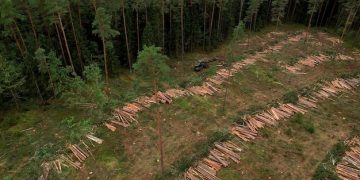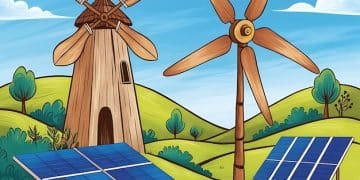Sustainable Living: Education for Climate Action & Advocacy

Sustainable living encompasses adopting eco-friendly practices, and education is key to understanding environmental issues and becoming effective climate advocates for a healthier planet.
Embark on a journey towards sustainable living through education, where you’ll unravel complex environmental issues and discover your potential as a climate advocate, influencing change for a greener future.
Understanding Sustainable Living Through Education
Sustainable living is a lifestyle choice that aims to reduce our environmental impact. Education plays a crucial role in understanding the complexities of this lifestyle, providing us with the knowledge and tools to make informed decisions.
It’s about more than just recycling; it’s about understanding the interconnectedness of our actions and their consequences on the planet, and sustainable education helps navigate this intricate web of relationships.
The Role of Education in Sustainability
Education is the cornerstone of sustainable living, providing the necessary knowledge to understand our environmental challenges. By learning about ecological systems, climate change, and resource management, we can make informed choices that minimize our footprint.
Key Areas of Sustainable Education
Sustainable education covers various topics, from renewable energy sources to waste reduction strategies. These areas empower individuals to make sustainable choices in their daily lives.
- Environmental Science: Learning the basics of ecology and environmental systems.
- Climate Change: Understanding the causes and impacts of global warming.
- Resource Management: Studying how to conserve and use resources efficiently.
- Sustainable Agriculture: Discovering ways to grow food without harming the environment.

Sustainable education equips individuals with the ability to critically evaluate the environmental impact of their actions. It empowers them to make choices that align with sustainability principles.
Environmental Issues Demystified: Sustainable Education’s Approach
Learning about environmental issues can be overwhelming. Sustainable education offers a structured approach to understanding these issues, making them more manageable and actionable.
By breaking down complex problems into smaller, understandable components, students can develop a clearer understanding of the root causes and potential solutions.
Climate Change: Causes and Consequences
Climate change is one of the most pressing environmental issues of our time. Education can help us understand the science behind climate change and its impacts on our planet.
Pollution: Types and Sources
Pollution is another significant environmental issue, affecting air, water, and land. Learning about the different types of pollution and their sources is crucial for addressing this problem.
Deforestation: Impact on Ecosystems
Deforestation, the clearing of forests for other land uses, has far-reaching consequences on ecosystems and biodiversity. Sustainable education aims to raise awareness and promote responsible forestry practices.
Sustainable education not only equips individuals with knowledge about environmental issues, but also instills a sense of responsibility and the motivation to take action.
Becoming a Climate Advocate: Skills and Knowledge
Climate advocates are individuals who actively promote policies and practices that address climate change. Sustainable education equips individuals with the skills and knowledge to become effective climate advocates.
These skills range from public speaking and communication to scientific literacy and policy analysis. By developing these competencies, students can effectively advocate for climate action in their communities and beyond.

Effective Communication Skills
Communicating complex scientific information clearly and persuasively is essential for climate advocates. Developing strong communication skills can help advocates reach a wider audience and influence decision-makers.
Scientific Literacy
A strong understanding of climate science is crucial for advocating for evidence-based policies. Scientific literacy enables advocates to critically evaluate information and challenge misinformation.
- Understanding Climate Science: Developing a solid understanding of the scientific principles behind climate change.
- Analyzing Policy Options: Evaluating the effectiveness and feasibility of different climate policies.
- Engaging with Decision-Makers: Communicating effectively with policymakers and other stakeholders.
By combining these skills, climate advocates can effectively promote policies and practices that address climate change and build a more sustainable future.
Practical Steps Towards Sustainable Living: Integrating Education
Sustainable living is not just a theoretical concept; it involves taking practical steps to reduce our environmental impact. Sustainable education provides the framework for integrating these steps into our daily lives.
From making conscious consumption choices to adopting energy-efficient habits, there are many ways to incorporate sustainability into our lifestyles.
Reducing Your Carbon Footprint
One of the most important steps towards sustainable living is reducing your carbon footprint. Transportation, energy consumption, and diet are major contributors to greenhouse gas emissions.
Conserving Resources
Conserving resources is another essential aspect of sustainable living. Reducing waste, recycling, and using water and energy efficiently can significantly reduce our environmental impact.
Supporting Sustainable Businesses
Supporting businesses that prioritize sustainability is a powerful way to promote environmentally responsible practices. Look for companies that use sustainable materials, minimize waste, and treat their workers fairly.
By integrating sustainable practices into our daily routines, we can create a more sustainable and equitable world for future generations.
The Future of Sustainable Education: Trends to Watch
Sustainable education is an evolving field, with new trends and approaches emerging constantly. Staying informed about these trends is crucial for ensuring that educational initiatives remain relevant and impactful.
From experiential learning to technology-enhanced education, there are many exciting developments shaping the future of sustainability education.
Experiential Learning
Experiential learning involves hands-on activities and real-world experiences that deepen understanding and engagement. Field trips, community projects, and internships can provide valuable learning opportunities.
Technology-Enhanced Education
Technology can play a significant role in enhancing sustainability education. Online courses, virtual simulations, and data visualization tools can make learning more accessible and engaging.
- Online Courses: Providing flexible and accessible learning opportunities.
- Virtual Simulations: Creating immersive experiences that allow students to explore complex systems.
- Data Visualization Tools: Helping students understand and interpret environmental data.
These trends hold great promise for advancing sustainable education and empowering individuals to become effective climate advocates.
Measuring Impact: Assessing the Effectiveness of Sustainable Education Initiatives
Assessing the impact of sustainable education initiatives is crucial for ensuring their effectiveness and identifying areas for improvement. By measuring outcomes and gathering feedback, educators can refine their approaches and maximize their impact.
This involves tracking changes in knowledge, attitudes, and behavior, as well as evaluating the overall effectiveness of educational programs.
Tracking Knowledge Gains
One way to assess the impact of sustainable education is to track how much students have learned about environmental issues and sustainability principles. This can be done through quizzes, tests, and other assessments.
Measuring Behavioral Changes
Measuring behavioral changes is another important aspect of impact assessment. This involves tracking whether students are adopting more sustainable practices in their daily lives, such as reducing waste, conserving energy, and supporting sustainable businesses.
Gathering Feedback
Gathering feedback from students, teachers, and community members can provide valuable insights into the effectiveness of sustainable education initiatives. This can be done through surveys, interviews, and focus groups.
By systematically measuring impact, educators can continually improve their programs and maximize their contribution to building a more sustainable future.
| Key Point | Brief Description |
|---|---|
| 🌱 Sustainable Education | Provides knowledge and tools for eco-friendly living. |
| 🌏 Environmental Issues | Covers climate change, pollution, and deforestation impacts. |
| 🗣️ Climate Advocacy | Develops communication and scientific literacy for effective change. |
| 👣 Practical Steps | Involves reducing carbon footprint and supporting sustainable businesses. |
Frequently Asked Questions (FAQ)
▼
Sustainable education is key because it provides the knowledge and awareness needed to address environmental challenges and promote eco-friendly practices for a healthier planet.
▼
Becoming a climate advocate involves gaining a strong understanding of climate science, developing effective communication skills, and engaging with decision-makers to promote sustainable policies.
▼
Practical steps include reducing your carbon footprint through changes in transportation and diet, conserving resources by reducing waste, and supporting businesses committed to sustainable practices.
▼
Sustainable education typically covers environmental science, climate change, resource management, and sustainable agriculture, providing a comprehensive understanding of environmental issues and potential solutions.
▼
Technology enhances sustainable education through online courses, virtual simulations, and data visualization tools, making learning more accessible, engaging, and effective in understanding complex environmental systems.
Conclusion
By embracing sustainable living through education, we can empower ourselves and future generations to become effective climate advocates and create a more sustainable and equitable world for all. Education is the key to unlocking a future where humanity and nature thrive together.





